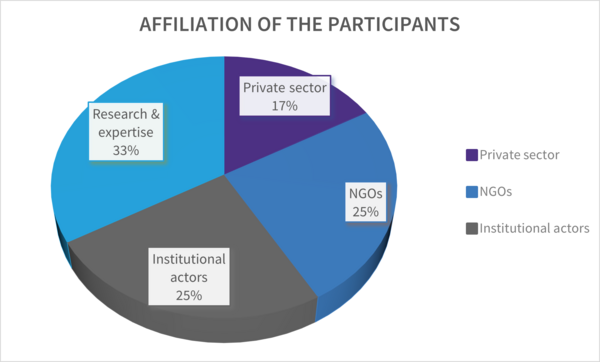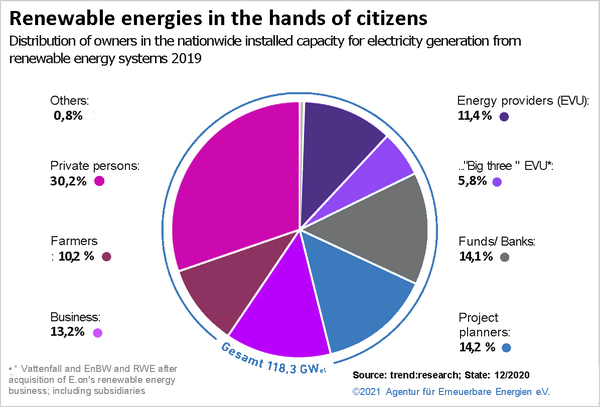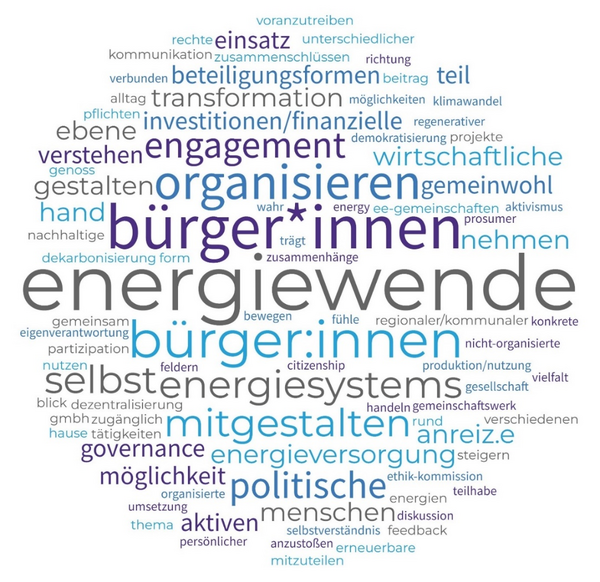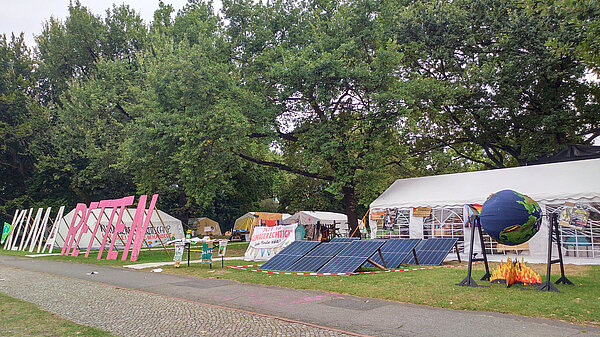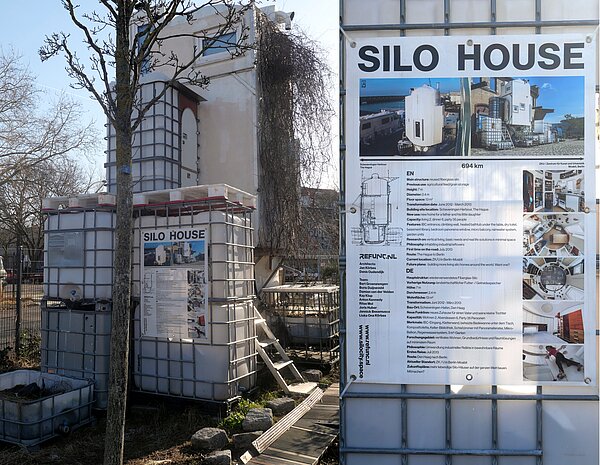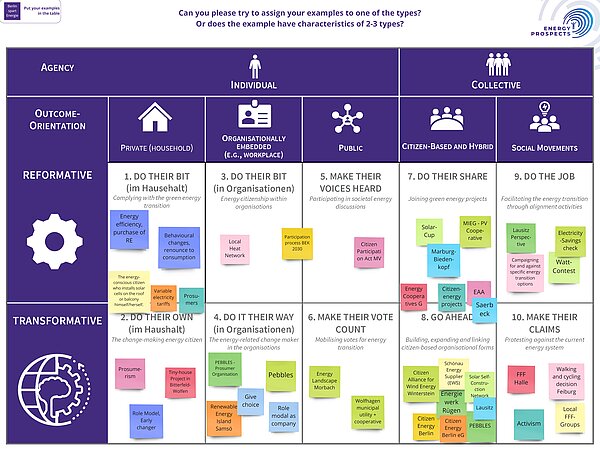Energy citizenship, what does it mean across different regions of Europe? We investigate this through four local language workshops in Spain (Galicia), Belgian Wallonia, Germany, and Hungary. We explored energy citizenship (ENCI) with NGOs, governmental organizations, activists, entrepreneurs and researchers with a good knowledge of the social-political particularities of the local context. These regional ‘translation’ workshops provide our ENCI explorations with concreteness, and with a ‘sense of place’. This third blog of the series focuses on the Berlin ENCI workshop, held on Tuesday, 8 February 2022 (online) with 13 participants (11 women) of various affiliations:
Energy citizenship and its translation in the German context
In German, energy citizenship can more or less be translated as "bürgerschaftliches Engagement in der Energiewende" (citizens’ commitment in the energy transition). This term is hardly used, whilst “Bürgerenergie” (citizen energy) has become a rather common term with the increasing number of citizen energy cooperatives in Germany and more generally with the high rate of citizen ownership of renewable energy sources in Germany (illustration below).
Nevertheless, all the participants had an idea of the broad meaning of "Energy citizenship", beyond that of citizen energy, as the variety of associations they suggested underlines:
Two aspects are particularly emphasised in the ENCI definitions provided by the workshop participants: 1) the active engagement and participation of the citizens in the energy transition process; 2) the political and economic dimensions of participation. A third aspect evoked later in the discussion can also be fruitfully mentioned here: individual and collective ENCI.
1) ENCI as active engagement and participation in the energy transition. A large majority of the definitions provided by the participants focuses on the ideas of personal engagement, of citizens’ participation towards energy transition and their commitment to the transformation. It suggests a broad spectrum of forms of engagement covering different aspects of the energy transition, with a focus on active participation, whether personally or collectively, to change/transform the current energy system.
2) Political and economic key dimensions of engagement. The political and economic —beyond the financial incentives — dimensions of participation are also given a specific attention, as well as the participation in governance processes at various levels, especially that of the local and regional.
3) Individual or collective ENCI. Energy communities and cooperatives were quite surprisingly not mentioned as self-evident equivalents of energy citizenship. On the contrary, the definitions proposed by the participants of the workshop suggest a view of energy citizenship that goes beyond the most salient forms represented by energy communities and cooperatives. Yet, the collective dimension of ENCI represents in itself an interesting question, raised as such by one of the participants: “I am surprised that the individual and the collective are brought together in the term ‘energy citizenship’. With regard to the literature, I wonder which part of it speaks for the energy citizenship literature and which for the community energy literature, they are definitely two different things.” Referring to a definition of citizenship rooted in traditional political theory, the participants underlined that the rights and duties attached to the notion of citizenship are distinct from activist forms of commitment: “With regard to citizenship, I miss the aspect of exercising one's own rights and duties, so if I act as an energy citizen and have certain attitudes, that's not a commitment in the sense, necessarily, and yet it makes a big difference whether I have this attitude or not. And also, at this point, whether I have possibilities to act according to my attitudes. From my point of view, that is separate from civic engagement in an organisation or somewhere where I am activist.”
This exploration of ENCI with German practitioners and experts unfolds how ENCI as a concept can easily make sense though its use is anything but widespread. It echoes with many ideals and visions of energy transition in which the citizens would be increasingly involved by addressing more and more aspects of the energy transition: communication and discussion about the multifaceted theme of energy transition, production and consumption of renewable energy, active contribution in co-creating the energy transition and participation in the governance processes at the local, regional and national levels.
Active participation and empowerment lay at the core of the understanding of ENCI, considered as an individual and collective commitment ranging from the everyday life to political to financial and economic forms of involvement.
Since the energy transition in Germany represents a widely accepted matter of concern, it results in highly active and committed conception of ENCI oriented towards a common good. As a counterpart, disempowered and disadvantaged people as well as more passive forms of involvement tend to remain out of the scope of ENCI.
This raises the question of the unintended consequences of being a frontrunner with regard to the energy transition in Europe. Indeed, to what extent can the German model of energy transition be translated or inspire other EU countries that currently belong more to the late-adopters? And how to involve the people that are currently left out of energy citizenship?
Exploring our conceptual typology of energy citizenship
The workshop was also a great opportunity to introduce the conceptual typology developed in D2.2 to the participants, who were asked at the beginning of the workshop to provide up to 3 examples of ENCI that they consider as particularly important. At the end of the workshop, the participants assigned the mentioned examples to the 10 ideal-types composing our conceptual typology:
Though not equally represented, all of the 10 types are covered by the cases provided by the participants of the Berlin workshop. In that respect, beyond the non-widespread use and the polysemy of the term ”energy citizenship”, our conceptual framework of ENCI and the typology developed seem to fruitfully encompass and account for the diversity of the forms of ENCI. The assignment of the examples to the 10 ideal-types raised a series of key issues related to ENCI cases and types, especially regarding the scales of action — and notably by comparing specific contextualised cases with more generic examples —, the time dimension and the dynamics of the types and the uncertainties between the reformative and transformative characterisation. Yet, beyond those limits, the typology proved to be a very efficient tool that enables to distinguish various forms of ENCI within generic examples (such as the energy cooperatives): it adds a further degree of understanding for various forms of manifest ENCI. It incites to further investigations of specific cases, for instance to provide a better understanding on how various types can combine with each other in an optimal way and how they do evolve across time and space. This is in our view one of the most promising outputs of the Berlin workshop.
